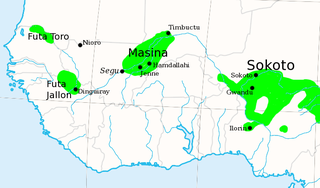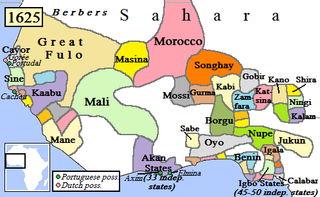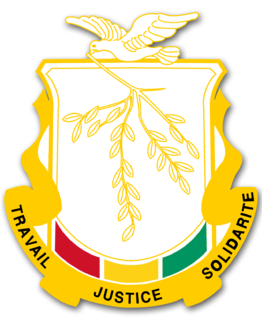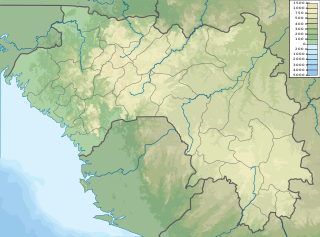
Alfa Yaya Maudo, was a 19th-century ruler of Labé, one of the nine provinces of the Imamate of Futa Jallon (a muslim state ruled by Fula leaders), in present-day Guinea.
Labé is the main city and administrative capital of the Fouta Djallon region of Guinea. It has a population of about 200.000. It is the second largest city in the country after the capital Conakry in term of economic importance. Labé is situated some 450 km northeast of Conakry close to the geographic centre of Guinea.

The Imamate of Futa Jallon or Jalon was a West African theocratic state based in the Fouta Djallon highlands of modern Guinea. The state was founded around 1727 by a Fulani jihad and became part of the French Third Republic's colonial empire in 1896.

The Fula people or Fulani or Fulɓe, numbering between 38 and 40 million people in total, are one of the largest ethnic groups in the Sahel and West Africa, widely dispersed across the region. As an ethnic group, they are bound together by the Fula language and their Islamic religious affiliation, their history and their culture.
Alfa Yaya was born in the mid-19th century in the village of Fulamori, Guinea. His father was Alfa Ibrahima Diallo, then leader of Labé and a central figure during the siege of Kansala, the capital of the kingdom of Kaabu.

The Kaabu Empire (1537–1867), also written Gabu, Ngabou, and N’Gabu', was a Mandinka empire of Senegambia centered within modern northeastern Guinea-Bissau, Larger parts of today's Gambia; Kingdom of Saloum, extending into Koussanar, Koumpentoum regions of South Eastern Senegal, and Casamance in Senegal. It rose to prominence in the region thanks to its origins as a former imperial military province of the Mali Empire. After the decline of the Mali Empire, Kaabu became an independent Empire. Kansala, the imperial capital of Kaabu Empire was annexed by Futa Jallon during the 19th century Fula jihads. However, Kaabu's vast independent Kingdoms across SeneGambia regions continued to thrive even after the fall of Kansala; until total incorporation of the remaining Kingdoms into the British Gambia, Portuguese and French spheres of influence during the Scramble for Africa.
Alfa Yaya rose to power as the French began pushing into the interior of Guinea. He adopted a favorable stance toward the French, using them to enhance his own power. After the French defeated Futa Jallon in 1896, Alfa Yaya signed an accord with them on 10 February 1897 giving him control over a then independent Labé.

France, officially the French Republic, is a country whose territory consists of metropolitan France in Western Europe and several overseas regions and territories. The metropolitan area of France extends from the Mediterranean Sea to the English Channel and the North Sea, and from the Rhine to the Atlantic Ocean. It is bordered by Belgium, Luxembourg and Germany to the northeast, Switzerland and Italy to the east, and Andorra and Spain to the south. The overseas territories include French Guiana in South America and several islands in the Atlantic, Pacific and Indian oceans. The country's 18 integral regions span a combined area of 643,801 square kilometres (248,573 sq mi) and a total population of 67.3 million. France, a sovereign state, is a unitary semi-presidential republic with its capital in Paris, the country's largest city and main cultural and commercial centre. Other major urban areas include Lyon, Marseille, Toulouse, Bordeaux, Lille and Nice.
Alfa Yaya's relationship with the French went downhill in 1904, when French ceded part of Labé to the control of Portuguese Guinea, effectively taking away part of Alfa Yaya's territory. The government of what was then French Guinea arrested Alfa Yaya the following year and deported him to the French colony of Dahomey in 1905. Though released in 1910, he was again arrested in 1911 and taken to Port Etienne, where he died of scurvy the following year, on 10 August 1912. In 1968 his remains were returned to Guinea. His tomb is at the Camayanne Mausoleum, situated within the gardens of Conakry Grand Mosque.

Portuguese Guinea, called the Overseas Province of Guinea from 1951, was a West African colony of Portugal from the late 15th century until 10 September 1974, when it gained independence as Guinea-Bissau.

French Guinea was a French colonial possession in West Africa. Its borders, while changed over time, were in 1958 those of the current independent nation of Guinea.

The Kingdom of Dahomey was an African kingdom that existed from about 1600 until 1894, when the last king, Béhanzin, was defeated by the French, and the country was annexed into the French colonial empire. Dahomey developed on the Abomey Plateau amongst the Fon people in the early 17th century and became a regional power in the 18th century by conquering key cities on the Atlantic coast.








